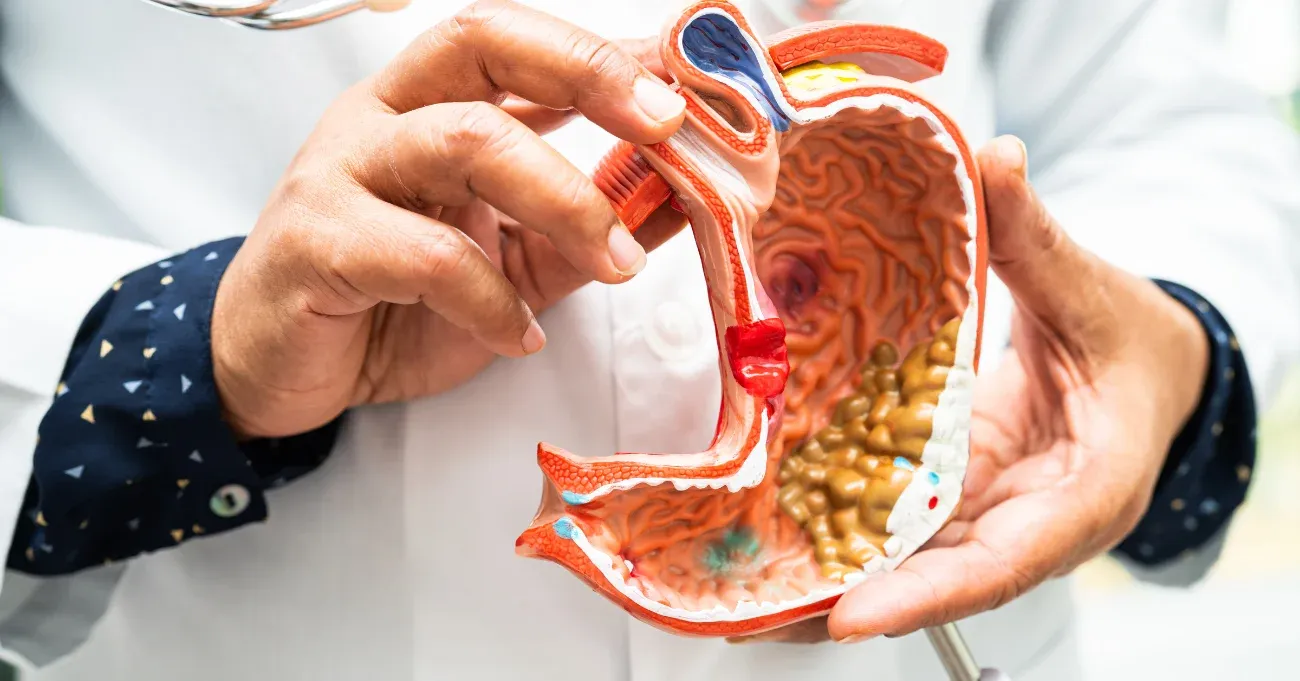
Small Intestinal Bacterial Overgrowth (SIBO) can cause discomfort and disturb your digestive health, characterized by common symptoms such as bloating, distension, and abdominal aches. Knowing how to test for SIBO at home allows access to awareness in the first stages, avoiding severe complications. Empowering yourself with the right tools and guidance enhances your ability to manage digestive health effectively and address SIBO proactively.
Nudge, a digestive health supplement company, is committed to helping you achieve good digestive health. Our SIBO formulation combines two natural yet potent ingredients developed to resolve the root causes of SIBO: gut motility issues and nutritional deficiencies. With our digestive wellness expertise, we can help manage symptoms and support long-term gut health.
Derived from our scientific research, we’ve compiled this guide to explore SIBO, what to expect from its symptoms, risk factors, and how to do at-home testing. By the end, you’ll know how to test for SIBO at home and why early diagnosis is essential to manage this condition and regain your overall well-being.
Let’s jump in!
What is SIBO (Small Intestinal Bacterial Overgrowth)?

Small Intestinal Bacterial Overgrowth (SIBO) is a condition where bacteria grow excessively within the small intestine, which normally has fewer bacteria than the large intestine. This leads to failures in absorption related to digestion. Understanding how to test for SIBO at home is essential for early detection and management.
SIBO is gaining much attention because it is far more common than initially perceived. It's estimated that SIBO can be present in up to 15% of healthy individuals and up to 80% of subjects with IBS. The prevalence may vary significantly and is often related to conditions like celiac disease, Crohn's disease, or diabetes, which increase SIBO risk.
Symptoms of SIBO
SIBO can present with diverse symptoms that often mimic other digestive disorders, making diagnosis challenging. Recognizing these symptoms with medical guidance is crucial for effectively managing the condition and restoring digestive health. Those who should know how to test for SIBO at home are individuals experiencing symptoms indicative of the condition.
- Bloating and Gas: Excessive bacteria can cause discomfort through stomach bloating, resulting in gas production following the fermentation of carbohydrates.
- Abdominal Pain or Discomfort: If gas accumulates in the digestive tract, it might lead to slight stabbing pain or discomfort of a general nature in the abdomen area.
- Diarrhea or Constipation: This represents a change in bowel movements, though diarrhea has been reported more often than constipation.
- Fatigue: Deficiencies can cause drained or fatigued feelings due to the malabsorption of critical nutrients in the small bowel.
- Unintentional Weight Loss: Such malabsorption, over time, can cause unintentional weight loss.
Potential Causes of SIBO
Knowing what causes SIBO will help deal with this problem effectively. Upon understanding the underlying causes, individuals and healthcare professionals can develop targeted treatment methods. Those interested in early detection may learn how to test for SIBO at home and discover some common causes:
- Diminished Motility of the Small Intestine: The development of conditions such as scleroderma or uncontrolled diabetes that may be part of your medical history presents impaired peristalsis and predisposes one to bacterial overgrowth.
- Structural Abnormalities: Anatomic defects and surgical changes can create milieus that foster bacterial growth.
- Low Gastric Acid Production: Stomach acid helps control the populations of bacteria; therefore, a lack of stomach acid and other digestive juices production allows overgrowth with the following digestive symptoms.
- Immune System Disorders: Weakness in one's immunological system may result in the body's inability to restrict bacterial growth.
Home Testing for SIBO
Learning how to test for SIBO at home can be done through breath tests, which are simple and convenient ways to diagnose SIBO from the comfort of your own home. After providing a sugar solution, you must submit breath samples. These samples are then analyzed for the presence of hydrogen and methane gases. Higher levels of these gases are signs of bacteria residing in the small intestine.
Types of Tests Available for SIBO at Home
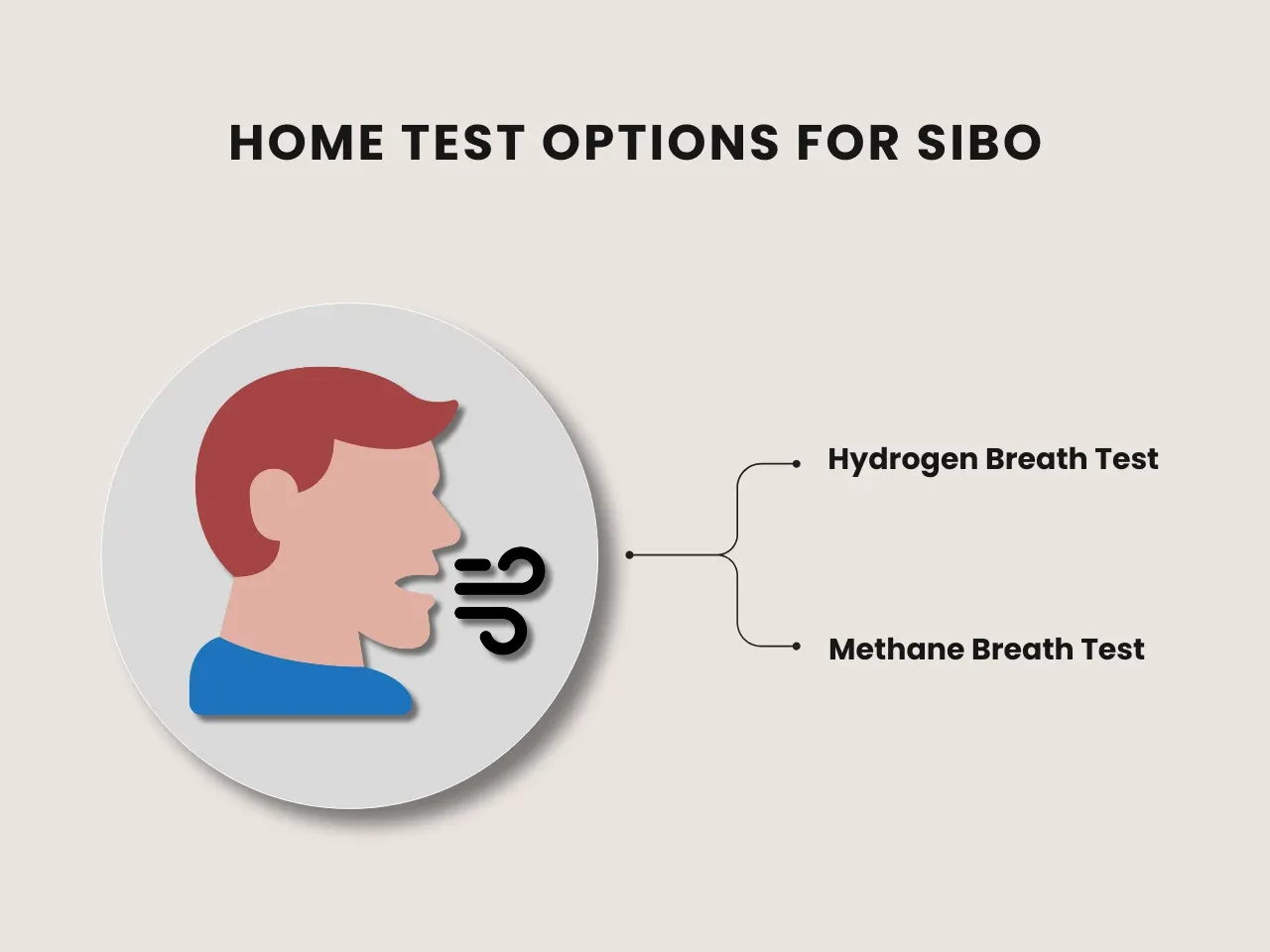
If you are experiencing symptoms of SIBO and prefer the convenience of testing at home, reliable options are available. The two commonly used tests are the hydrogen and methane breath tests. Explore these options for accurate results and to take charge of your digestive wellness.
- Hydrogen Breath Test: The test involves ingesting a glucose or lactulose solution and providing breath samples at specified periodic intervals. If hydrogen is present in the breath, it indicates bacterial fermentation of sugars occurring in the small intestine.
- Methane Breath Test: This is the same as the hydrogen breath test but tests for methane levels in your breath. Some have gut bacteria that produce more methane than hydrogen—so this test is a good alternative for some.
To learn how to check for SIBO at home, you can purchase at-home breath tests online from reputable medical supply companies or healthcare providers offering them directly. Look for companies that provide clear instructions and support to ensure you perform the test correctly.
Interpreting Your Test Results
Knowing your home test results and understanding how to test for SIBO at home is essential. Your test can provide critical insight into your digestive health, feelings, and the best course of action. Let us break down these results:
- Normal Results: Levels of hydrogen less than 16 ppm are normal.
- Elevated Hydrogen Levels: If your hydrogen level increases more than 20 ppm within 90 minutes, it's likely a sign of SIBO. This indicates that sugars are fermenting in the small intestine rather than the large intestine.
- High Methane levels: High methane levels can also indicate SIBO, mainly if the bacteria in your intestines can primarily produce methane gas.
What Your Results Could Indicate
Understanding how to test for SIBO at home allows you to interpret your test results effectively, providing insights into your digestive health and identifying the underlying cause of your symptoms. Here’s what your test results may indicate:
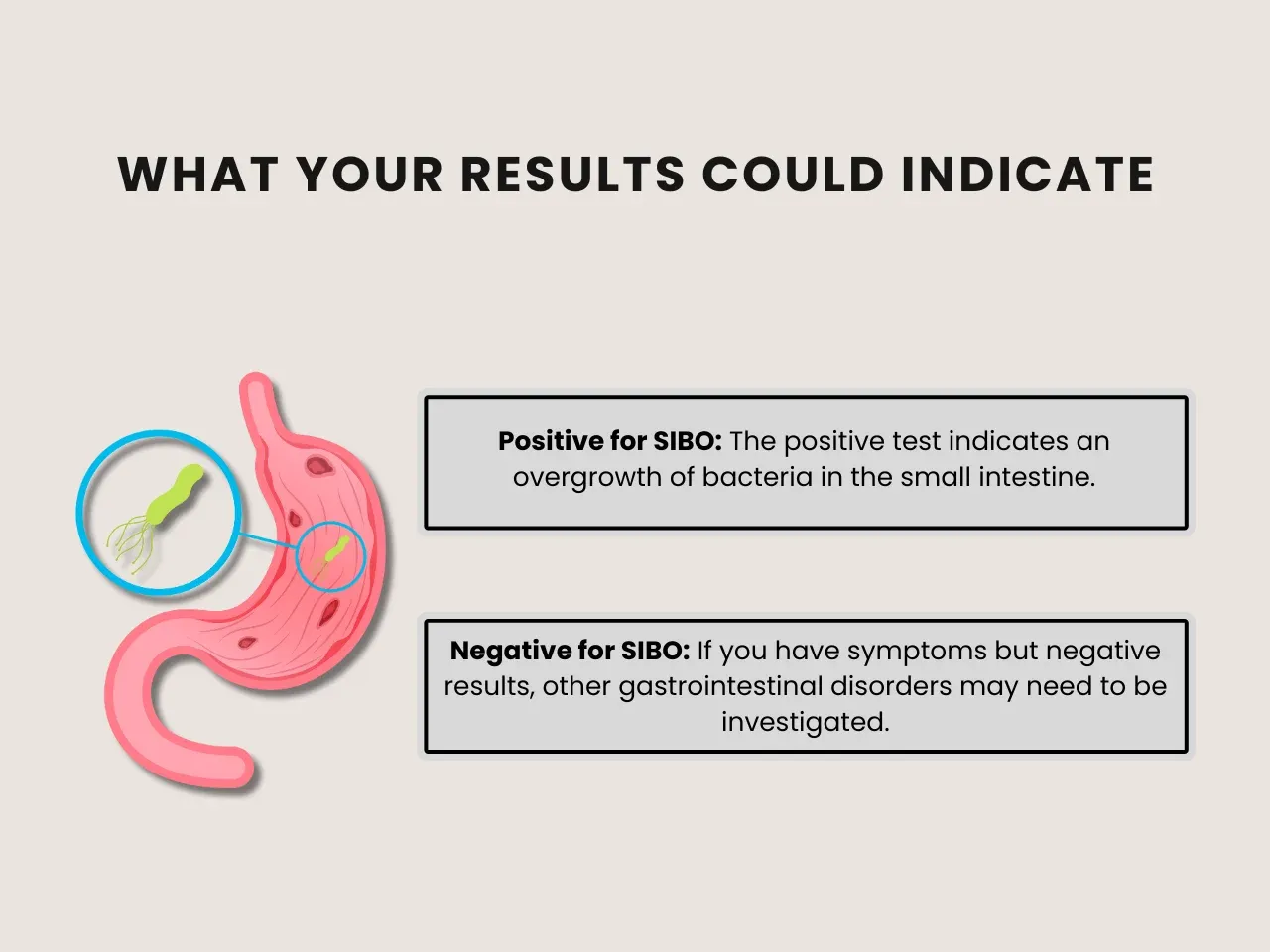
- Positive for SIBO: The positive test indicates an overgrowth of bacteria in the small intestine. Endzieger is notorious for causing many symptoms, including bloating, diarrhea, and bellyaches.
- Negative for SIBO: A negative result, despite having symptoms, may suggest other gastrointestinal disorders that require further investigation.
If the results turn positive, it’s important to follow up with a doctor for possible treatments, including antibiotic therapy or dietary changes. If they turn negative but you continue to experience the symptoms, further evaluation by a doctor is necessary.
Common Pitfalls to Avoid in Home Testing for SIBO
While learning how to test for SIBO at home can be beneficial, inevitable mistakes can severely compromise your results. So, to get the most accurate information, it is essential to avoid falling into common pitfalls. Here's what you should watch out for:
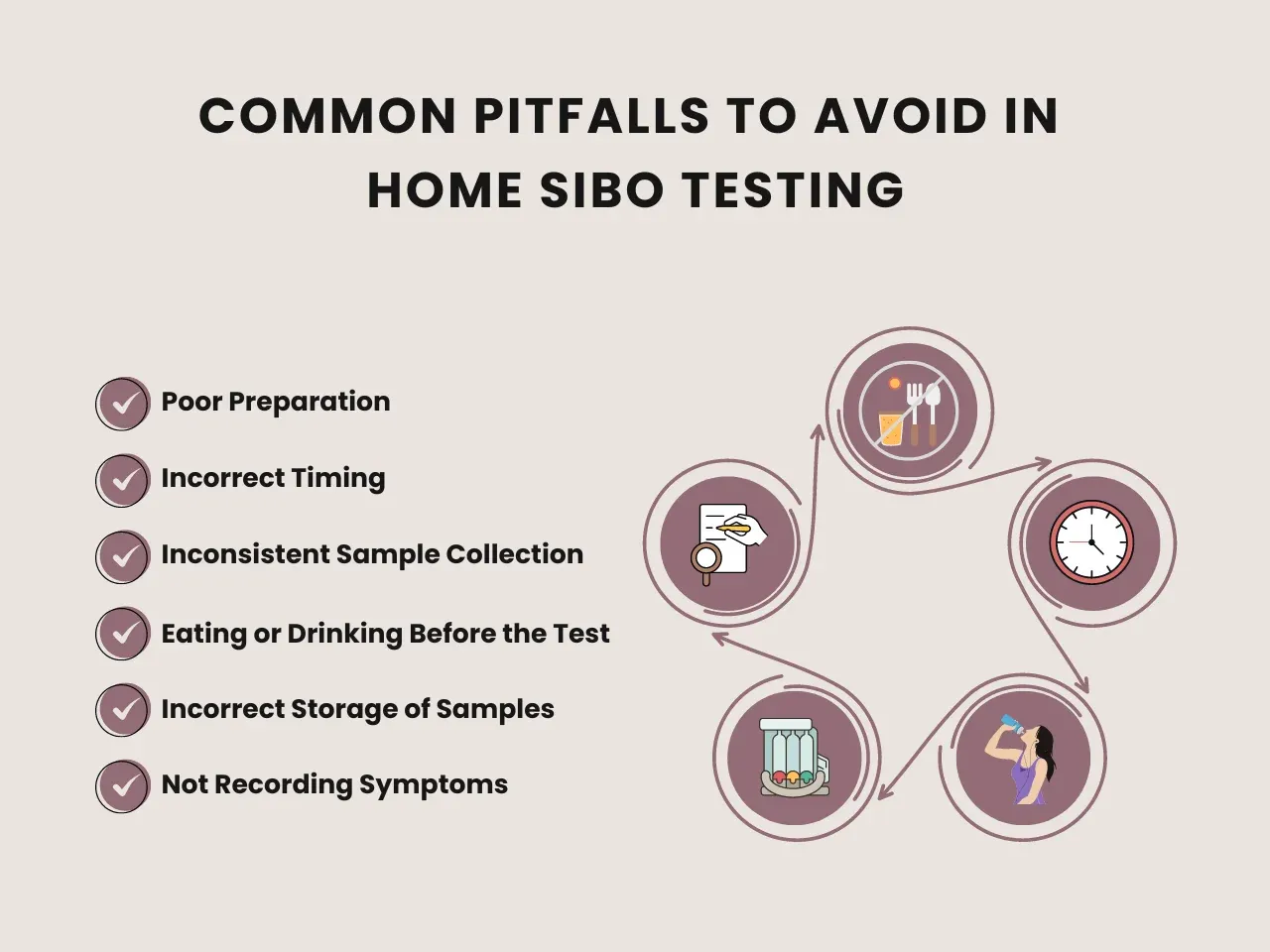
- Poor Preparation: Failure to follow test preparation instructions, such as fasting or withholding specific medications, may lead to inaccurate results. This will alter the test result and thus create an uncertain position regarding your gastrointestinal health status.
- Incorrect Timing: Collecting breath samples at incorrect intervals can introduce errors. Deviation from the recommended collection timing misrepresents data indicating your digestive functionality.
- Inconsistent Sample Collection: If samples are collected differently each time, this can alter the reliability of your results. Follow precisely any protocol provided for sample collection.
- Eating or Drinking Before the Test: Do not drink anything except water the hours before your test. Eating or drinking before the test may alter your results, as food and beverages—specifically, sugar and carbohydrate-containing foods and drinks can increase your blood glucose.
- Incorrect Storage of Samples: Improper storage of breath samples can degrade or contaminate them, compromising result accuracy. To preserve these, carefully follow the storage instructions.
- Not Recording Symptoms: Failing to document symptoms and changes in your condition during testing can make result interpretation challenging. Keep a detailed log of your symptoms to provide context for your test results.
Tips for Ensuring Accurate Test Results
There are certain practices that best ensure reliable results when learning how to test for SIBO at home. Preparation and strict adherence to the guidelines will ensure accurate test results. Follow these practices to ensure that your test provides the most precise information:
- Follow Instructions Carefully: Note the instructions provided with your test kit, including dietary restrictions and times of sample collection. All tests have instructions to be carried out to give an accurate result; follow them to a tee.
- Avoid Some Foods and Activities: Before the test, avoid high-fiber foods, smoking, and vigorous exercise, as they can affect test outcomes. Stick to the recommended dietary restrictions and lifestyle changes to prevent interference with your results.
- Repeat the Test if Necessary: If your results are inconsistent, you should repeat the test only after consulting a healthcare provider. Sometimes, re-testing is very important to prove the truth and accuracy of the information.
- Stay Well-Hydrated with Caution: Drink lots of water days before the test, but only drink a little right before the collection. Good hydration will help present the most accurate result without jeopardizing the integrity of the drug test.
- Sample Collection Should Be Consistent: Be sure to collect and handle samples precisely as instructed. The accuracy of your test results depends significantly on how consistently you have collected, stored, and sent your samples for testing.
Keep a record of all the relevant details: symptoms felt, food eaten, and activities done before and during the testing period. This information can be beneficial in interpreting your results accurately when learning how to test for SIBO at home and understanding potential discrepancies.
Treatment Options for SIBO
Management of SIBO should be individualized and involve dietary changes, over-the-counter remedies, and professional treatments, all balanced together. Knowing what works best for you and how to test for SIBO at home can alleviate symptoms and promote good gut health. Now, let's explore practical strategies to help you overcome SIBO and return to feeling your best.
Dietary Changes to Manage SIBO
Dietary changes are critical in managing SIBO, as they can significantly impact the digestive system. However, that can make quite a big difference, especially if one has other underlying conditions that may influence digestion, like lactose intolerance. Here are some dietary strategies to help with this:
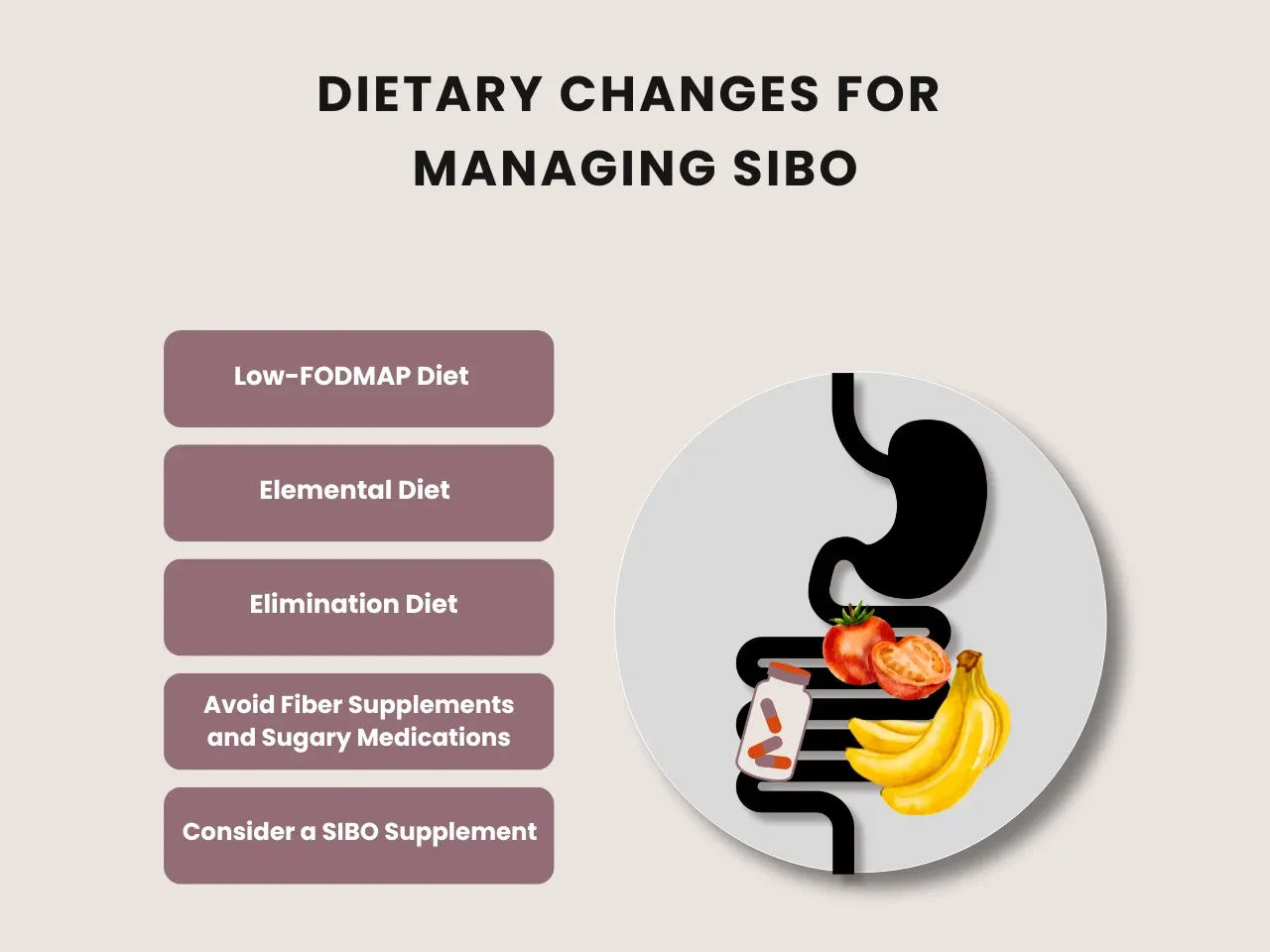
- Low-FODMAP Diet: This diet eliminates fermentable oligosaccharides, disaccharides, monosaccharides, and polyols—carbohydrates that can exacerbate SIBO symptoms. Food items rich in FODMAPs, such as apples, onions, wheat, dairy products, and specific food mixes containing these ingredients, are typically excluded.
- Elemental Diet: This is a more aggressive approach in which you consume liquid formula with predigested nutrients. This diet gives your gut a critical, much-needed rest and should be undertaken under the close supervision of a healthcare professional.
- Elimination Diet: Identifying and eliminating certain foods that trigger your symptoms. This approach is a perfect way to determine what's causing the problem, but it's best done with professional guidance to ensure you're still getting the nutrients you need.
- Avoid Fiber Supplements and Sugary Medications: Fiber supplements and sugar-alcohol medications significantly worsen symptoms. Avoiding them helps you learn how to manage the symptoms better, primarily when issues are related to carbohydrate malabsorption.
- Consider a SIBO Supplement: Adding a supplement like the Nudge SIBO supplement to your routine supports digestive health. This supplement contains natural ingredients that target SIBO symptoms and can help maintain a balanced gut environment.
Dietary changes and the addition of supportive SIBO supplements like Nudge should be made after consulting a dietitian or digestive health expert. They will help design a special diet that meets your needs by ensuring proper nutrition and effective SIBO management. Additionally, knowing how to test for SIBO at home can assist in tracking the effectiveness of these dietary changes.
Over-the-Counter Remedies and When to Use Them
Although not always possible, over-the-counter remedies can sometimes help alleviate SIBO quickly. Understanding how to test for SIBO at home can aid in monitoring your condition and determining when these remedies might be appropriate. Explore some of the more common options and when they might be relevant:
- Probiotics: While probiotics are vital for gut balance, their effectiveness can be entirely mixed with SIBO. Some probiotics may even worsen symptoms, so take them with caution.
- Antacids: If you are suffering from discomfort caused by low stomach acid, antacids could help provide relief. However, they are not suitable for long-term use, so talk to a healthcare provider about using them regularly.
- Digestive Enzymes: These dietary supplements can support digestion and, as a bonus, relieve other symptoms such as bloating or discomfort, making them beneficial additions to your regimen.
Disclaimer: Always consult a healthcare provider before starting any new over-the-counter treatments, especially if you have other health conditions or are taking medications. Understanding how to test for SIBO at home can help you monitor your condition, but it should not replace professional medical advice.
Professional Treatments and When to Consider Them
When dietary changes and over-the-counter remedies aren't effective for managing SIBO, consider more intensive treatment options. Knowing how to test for SIBO at home can help you monitor your condition and decide when to explore professional treatments. Check out these professional options designed to help you dive deeper into problems and offer relief at a much more micro level:
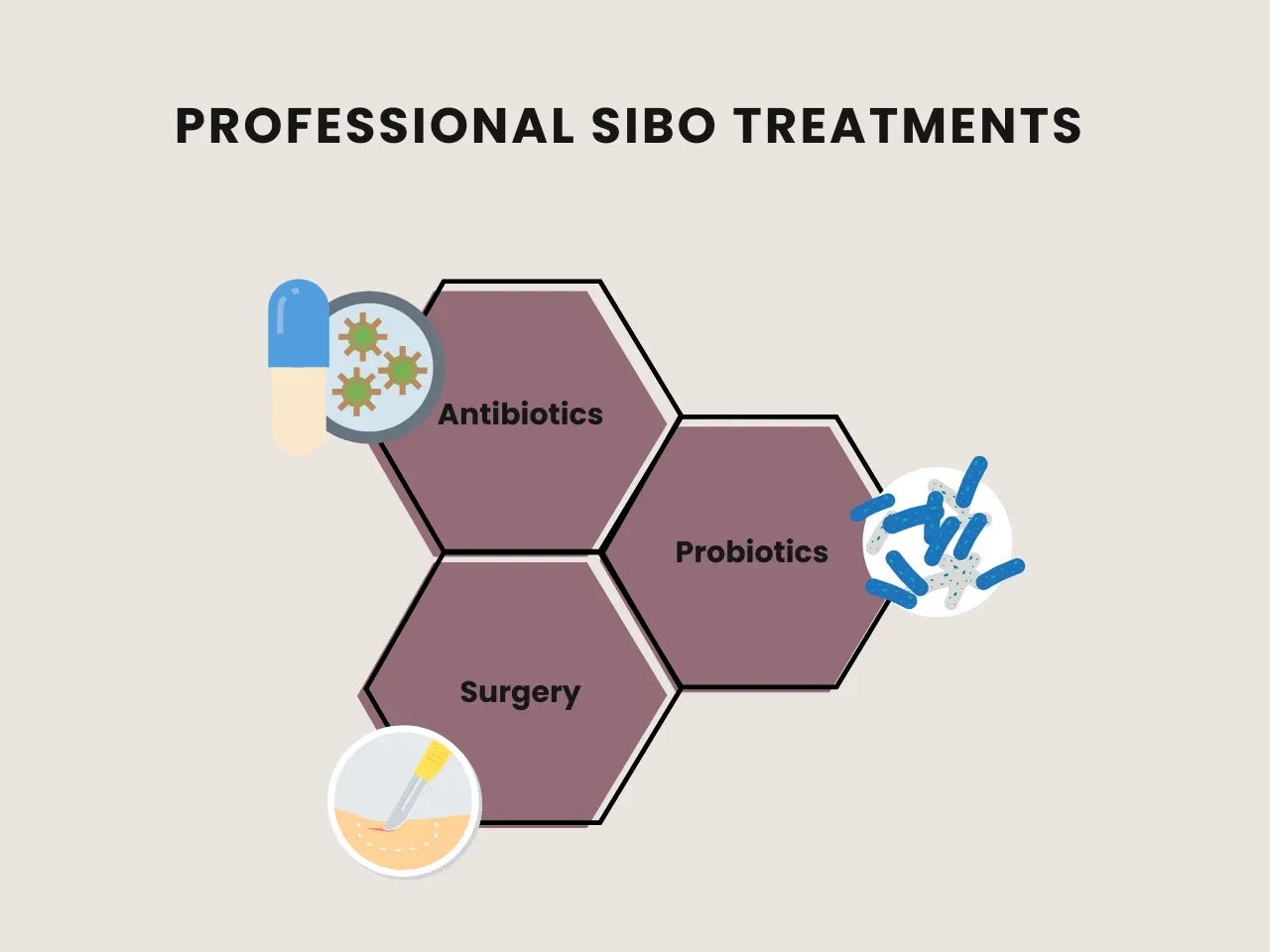
- Antibiotics: Prescription antibiotics like Rifaximin or metronidazole target bacterial overgrowth in the small intestine and are tailored to specific test results.
- Probiotics: Some doctors may recommend the best probiotics to reinstate gut bacteria. However, this should be done under a doctor's care because sometimes probiotics can worsen symptoms.
- Surgery: Surgical correction may be necessary for anatomical issues—for example, blind loops or blockages—contributing to SIBO.
If you have tried dietary changes and over-the-counter remedies but continue to struggle, or if you are experiencing more severe symptoms like dramatic weight loss, chronic malnutrition, or serious vitamin deficiencies, then professional medical intervention must be your next step for further evaluation and treatment.
Key Takeaway
Understanding how to test for SIBO at home can significantly empower you in managing your digestive health. While healthcare professionals typically employ specific tests for diagnosing bacterial overgrowth in the small intestine, at-home testing can offer preliminary insights. Symptoms like bloating, abdominal discomfort, and excessive gas may suggest SIBO and prompt you to explore testing options.
At-home breath testing, which measures gases produced by bacteria, offers a convenient starting point. However, consulting a healthcare provider is essential for accurate diagnosis and appropriate treatment. Self-diagnosis alone might lead to complications or mismanagement, so professional guidance is crucial.
Ready to take charge of your digestive health with effective at-home testing? Discover how Nudge can support you with specialized supplements that complement SIBO management. Our all-in-one pill solutions are crafted to enhance digestive health. Check out our free trial today and explore how Nudge can make a difference with our range of targeted supplements and personalized support options.